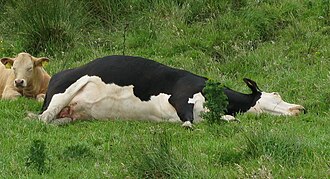
Cow tipping is the purported activity of sneaking up on any unsuspecting or sleeping upright cow and pushing it over for entertainment. The practice of cow tipping is generally considered an urban legend[1] and stories of such feats viewed as tall tales.[2] The implication that rural citizens seek such entertainment due to lack of alternatives is viewed as a stereotype.[3][4] The concept of cow tipping apparently developed in the 1970s, though tales of animals that cannot rise if they fall has historical antecedents dating to the Roman Empire.
Cows routinely lie down and can easily regain their footing unless sick or injured. Scientific studies have been conducted to determine if cow tipping is theoretically possible, with varying conclusions. All agree that cows are large animals that are difficult to surprise and will generally resist attempts to be tipped. Estimates suggest a force of between 3,000 and 4,000 newtons (670 and 900 pounds-force) is needed, and that at least four and possibly as many as fourteen people would be required to achieve this. In real-life situations where cattle have to be laid on the ground, or "cast", such as for branding, hoof care or veterinary treatment, either rope restraints are required or specialized mechanical equipment is used that confines the cow and then tips it over. On rare occasions, cattle can lie down or fall down in proximity to a ditch or hill that restricts their normal ability to rise without help. Cow tipping has many references in popular culture and is also used as a figure of speech.
- ^ Zotti, Ed (1996). Brunvand, Jan Harold (ed.). American Folklore: An Encyclopedia. New York and London: Garland Publishing. p. 354. ISBN 0-8153-3350-1. Archived from the original on October 13, 2023. Retrieved May 23, 2016 – via Google Books.
- ^ Cite error: The named reference
Eatonwas invoked but never defined (see the help page). - ^ Winter, Sam A. (March 6, 2003). "Who You Calling a Hick?: Treatise of a Disgruntled Kansan". The Harvard Crimson. Archived from the original on June 4, 2015. Retrieved December 28, 2014.
- ^ Ward, Philip (2012). The Book of Common Fallacies: Falsehoods, Misconceptions, Flawed Facts, and Half-Truths That Are Ruining Your Life. New York, N.Y.: Skyhorse Publishing. p. 107. ISBN 978-1-61608-336-6. Archived from the original on October 13, 2023. Retrieved November 29, 2015 – via Google Books.
In his article at the Harvard Crimson, John Larew insists that since he arrived at college, every time he has told someone (especially someone from the city) where he grew up (deep in the country), they inevitably ask what he does for fun, and whether or not he's been cow tipping...[T]he New York Times... perpetuates the mistake when the editor writes 'Saturday night is associated with pleasure and abandon, with toppling cows in rural Pennsylvania'.